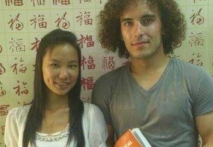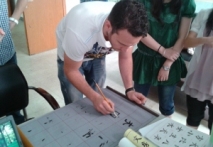Latest News
- Wuxi's Nanchang Street--a historic cultural district that combines classical charm, delicious food, and fun activities
- chinese study
- lastest courses
- Business Assistance/International Consortium of Stem Cell Research
- Foreigner's view of Jiangsu -Changzhou Jintan starts
- estimonials for Our new French Internship student Anais 企业表扬信
- The Double Seventh Festival in China Introduction
- Chinese Proficiency Test (HSK)
- China University Mining and Technology
- Wuxi Library
Students Say
Mandarin Student Zack
Mandarin Education School is a great place to learn Chinese and Chinese Culture.I've learned a lot in this school, my Chine...
Learn Chinese Travel China
If you want to learn Chinese and also discover China, Mandarin Education organize the most funny and cultural study tour.
The...
suzhou Mandarin Jude
I am Jude, I am learning Mandarin in Suzhou Mandarin School,I was learning in Wuxi Mandarin Education too.I like my Chinse Teacher...
chinese class
Improve your reading, speaking and your writing by experiencing our teaching methods,Offer free student Visa.
...
Wuxi Mandarin Jessie
I've learned Chinese for almost 8 years, I can understand what Chinese people say,but when I speak, I feel very uncomfor...
Chinese Internship or Jobs
You are looking for a professional experience abroad? Get the opportunity to discover the Chinese business,Look for an ...
Mandarinedu Student Florent
I love my Wuxi Mandarin Education School. It is the EASY MANDARIN Learning way, I am learning faster than I wanted.My teach...
Mandarin E Learning
Mandarin Education School offers you Online Chinese Courses. It has never been so easier to have Chinese courses ...
Mandarin Student Brad
I am studying Chinese in Mandarin Education School. I can speak quit good Chinese and talk to Chinese people by myself. Thank...
Wuxi Mandarin edu. Student Jennifer
I love learning Chinese in Mandarin Education School.That's a great place to learn and make friends.
...
Add Our School Official
to get more informations

0086 1866 1199 988
0086 510-81151808
Sandy.Swun
519988808
Mandarin Education School
Room 405, 4 Fl,Building No.8,
Maoye Business Center,
Chang jiang No.1,
New district , Wuxi City , China

by EM CASALENA
1. Beckoning with the down-turned palm
Westerners will sometimes use their index finger to tell someone to “come here,” but that’s not how it’s done in many Chinese-speaking cultures. To beckon someone, pull your fingers in a down-turned or sideways palm towards your body. This will almost look like a cat pawing at something.
This is a gesture mostly used among friends and young people. This motion wouldn’t be the best to use when communicating with your older native Chinese boss or superior. In a case like that, try your best to establish eye contact with the person and bow slightly. This is a much more formal beckoning gesture.
2. Place your chopsticks on top of your bowl
Instead of sticking your chopsticks into your dish bowl or onto a napkin when you’re done eating, it’s customary to place chopsticks that aren’t in use horizontally on top of your bowl. In Chinese-speaking cultures (as well as several other Southeast Asian cultures) it’s a big no-no to stick your chopsticks upright into your rice while dining with others.
This mimics the appearance of funeral incense and is considered a sort of “death” omen. Younger generations don’t mind as much—but doing this will still make one look a bit ignorant.
3. Present and accept gifts with both hands
When offered a gift, don’t snatch it up with one hand. Take the box or bag with both of your hands. Additionally when offering a gift, don’t offer it with just one hand, no matter how small the gift.
You should also do this when you accept or offer business cards. You want to make sure your potential business associate remembers you for the right reasons, so be sure to use both hands!
4. Keep greetings formal
Are you a big hugger? Sadly, this may not go over so well in China. Touchiness and PDA are less common in Chinese culture. Hugging, kissing cheeks, back-slapping or reaching out to touch a pin or tie before complimenting it are all major no-nos.
Nodding with a polite smile or shaking hands are preferred gestures when greeting someone over friendly hugs.
Additionally, try to greet the oldest person first if you’re meeting a family or group of people. (Although younger Chinese people don’t really care about this.)
5. Stand up for a toast
It’s interesting how toasting can vary so much among different cultures. When throwing back a shot during a Chinese toast, stand up or tap the table with your palm somewhat loudly while drinking. This is just considered a more participatory, social way of making a toast at a party or business venture. Make sure you toast everybody at the table before drinking, too!
The default Chinese toast is 干杯(gān bēi!) —Dry cup!
6. Point to your nose
In Western cultures, one will often touch their chest when referring to themselves. In China, you should point to your nose when referring to yourself. Also, don’t touch someone else’s schnoz. It’s rude.
In places like Australia and New Zealand, this nose-touching gesture is a sort of wry one, while in the United State this may be seen as a gesture for thinking.










